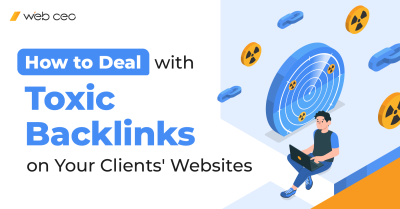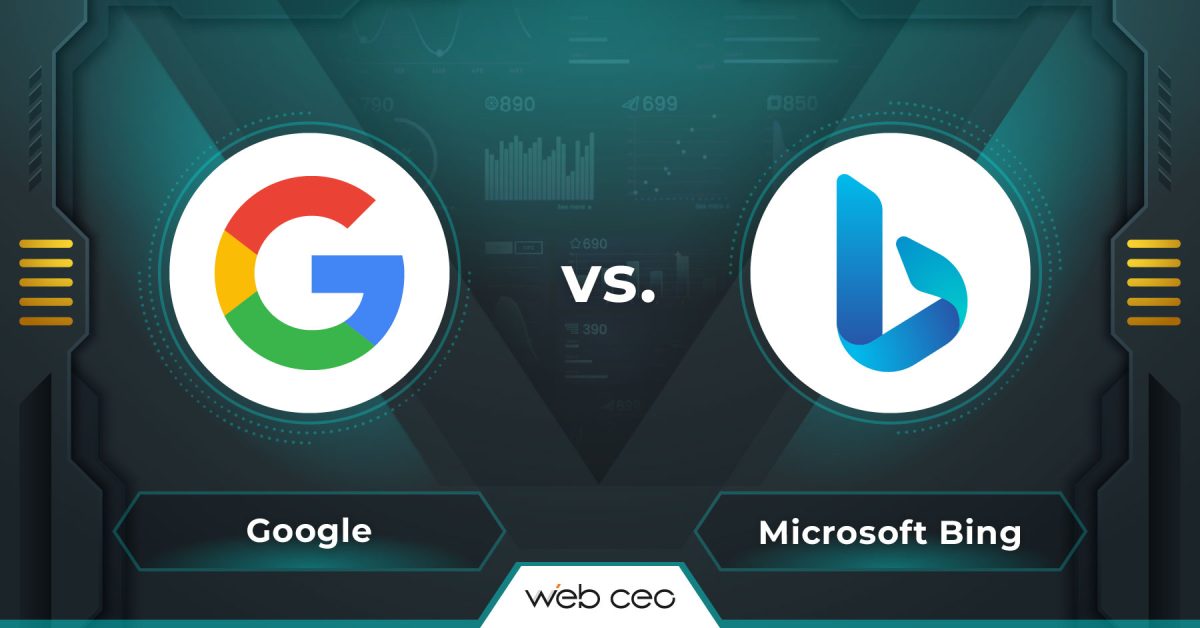
Welcome, readers! Remember when we discussed Microsoft Bing in our previous article titled “Microsoft Bing: The Rising Star of Online Search”? Well, guess what? We’re back to fulfill our promise of bringing you a detailed comparison between Bing and the search engine titan, Google.
In our previous piece, we reviewed Bing’s impressive features and capabilities, exploring how it has steadily gained recognition as a rising star in an online search.
Now, let’s focus on the epic battle between two prominent search engines: Bing and Google. In this article, we’ll analyze and compare these two formidable contenders, shed light on their strengths and weaknesses, and discuss SEO optimizations between them. Let’s get the party started!
Market share comparison between Google and Microsoft Bing
According to data from Statista.com, in March 2023, Bing controlled 8.23% of the global search engine market, while Google dominated with 85.53%.
Despite Google’s overwhelming market dominance, here is a reason why you must take Bing seriously. That seemingly modest 8.23% translates into 100 million daily active users and more than 1 billion unique visits per month for Bing. With that amount of searches, you would be crazy to ignore them.
Moreover, one-third of online searches in the United States are conducted through Microsoft resources, which include Bing, Yahoo, and voice search. As a result, optimizing your website and content for Bing can significantly enhance your visibility and reach among American internet users.
Comparing Google vs. Microsoft Bing’s Functionality
Home Page Comparison
Google Home Page
The Google homepage presents a highly simplistic and minimalist design. Users see a central search bar and can easily navigate to various Google tools such as Gmail, Google Drive, and YouTube. Additionally, Google offers the functionality of image and voice searching.
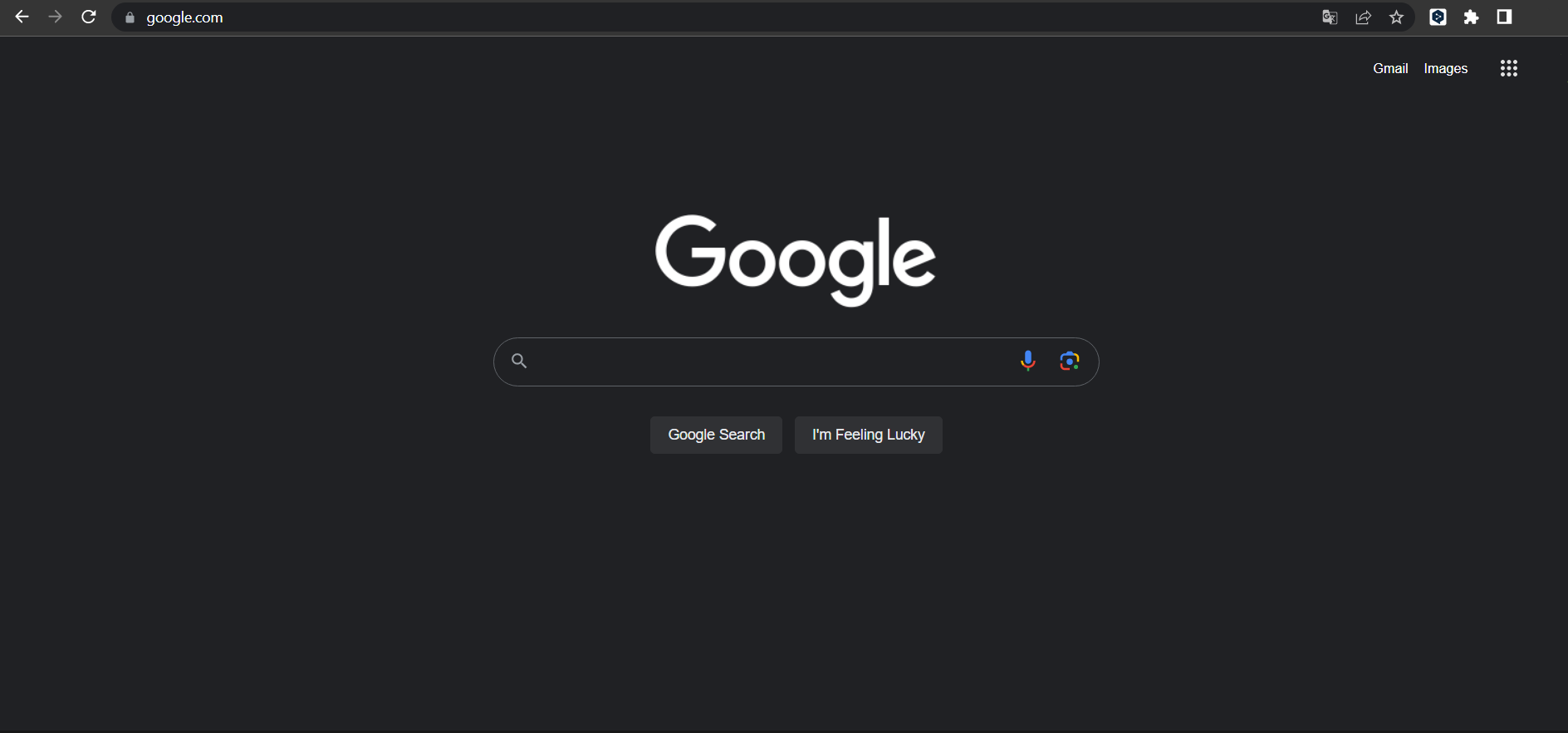
Furthermore, there is an “I’m Feeling Lucky” button that can generate random search queries, providing users with a fun and educational way to pass the time.
Bing Home Page
Bing’s homepage always features a charming “Picture of the Day” that changes every twenty-four hours. Alongside the search bar, users can explore an endless news feed, allowing them to stay updated on the latest events and news.
Bing’s homepage boasts visually appealing elements and offers a greater variety of options compared to Google.
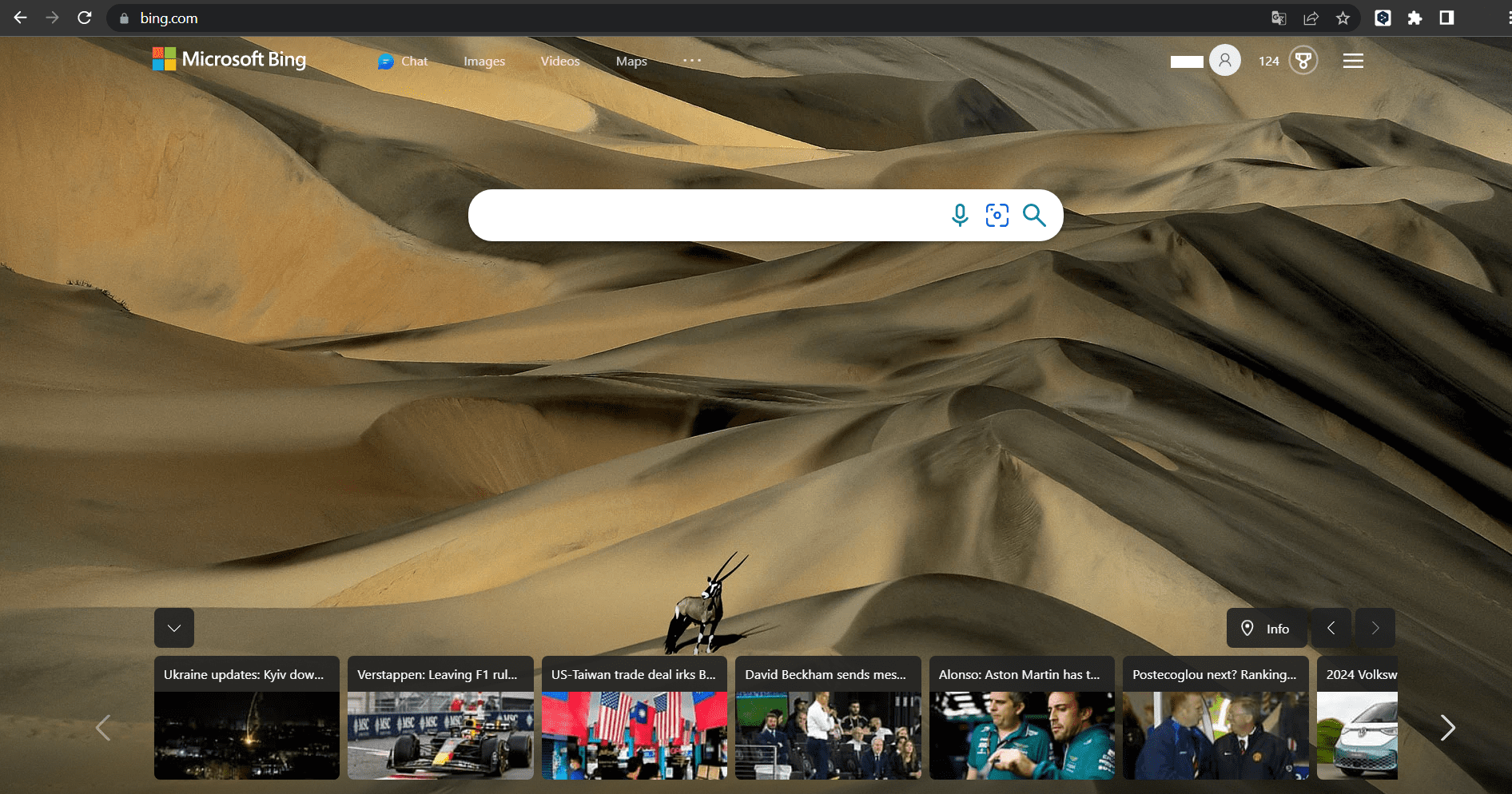
From the homepage, users can access a plethora of tools and activities, including millions of lessons covering various subjects, travel reviews, health exercises, and up-to-date news.
For those with a penchant for nostalgia, Bing also offers a selection of browser games for authentic entertainment.
Image Search Comparison
Google Image Search
Google Image Search is likely to impress you less than Bing will. It lacks any additional features or standout characteristics. It may even be less convenient for users because Google Image Search has fewer search filters than Bing.
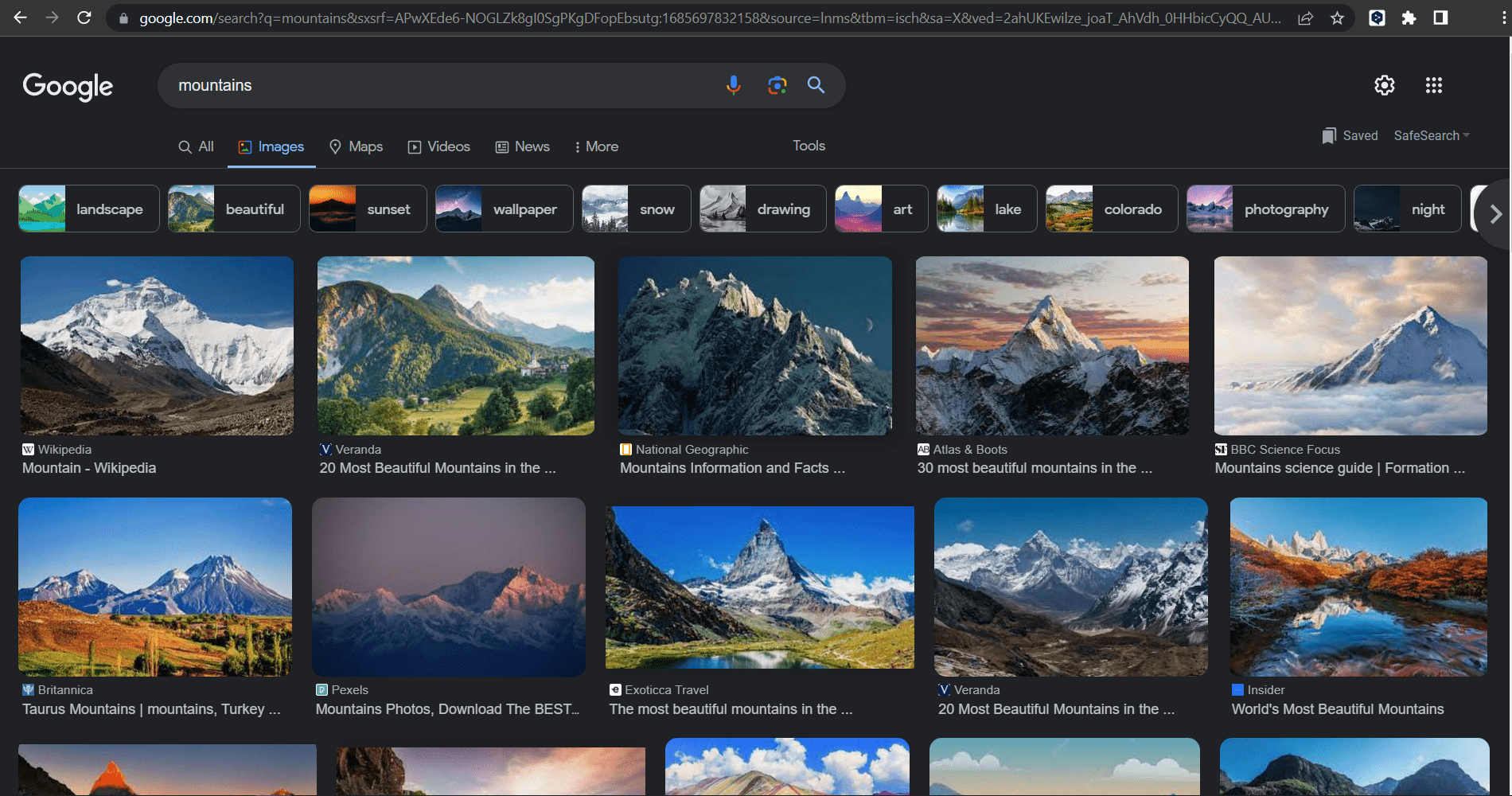
Additionally, Google imposes strict censorship, even with SafeSearch turned off. While Google allows you to find what you need, it is not as diverse, engaging, and multifunctional as Bing.
Bing Image Search
You can find a vast collection of random images directly from the Bing homepage by simply clicking on the images section. This feature makes it easy to explore and discover pictures without any queries. It’s a convenient way to browse and, for instance, select a new desktop wallpaper. When you choose an image, you can also see which websites utilize that particular image and select from various sizes available.
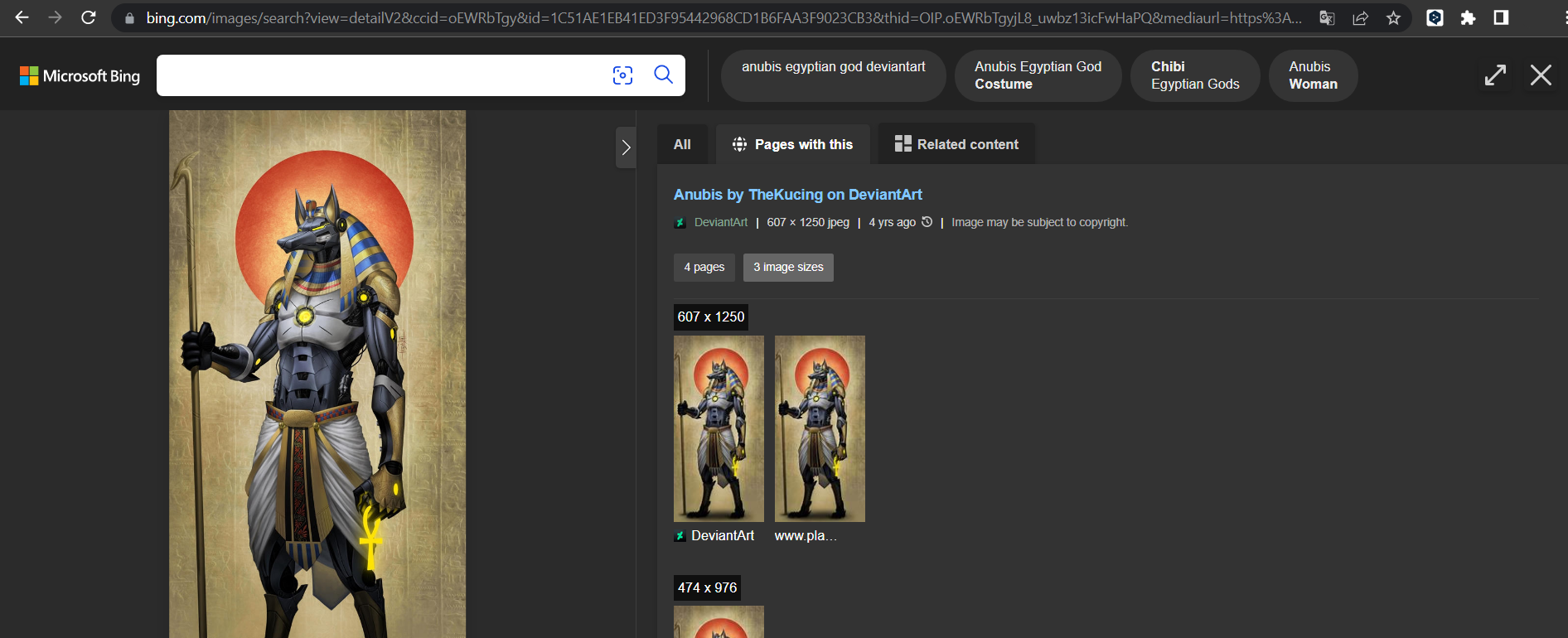
The standout feature in Bing’s image search is its capability to generate images using artificial intelligence. You can input any query, and the A.I. will generate an image based on your request. This feature adds an element of fun and convenience, particularly when you require quick image creation. However, it’s important to note that all generated images have a resolution of 1024×1024. Let’s look at the result of my query.
“Big chair on the ice surrounded by polar bears”
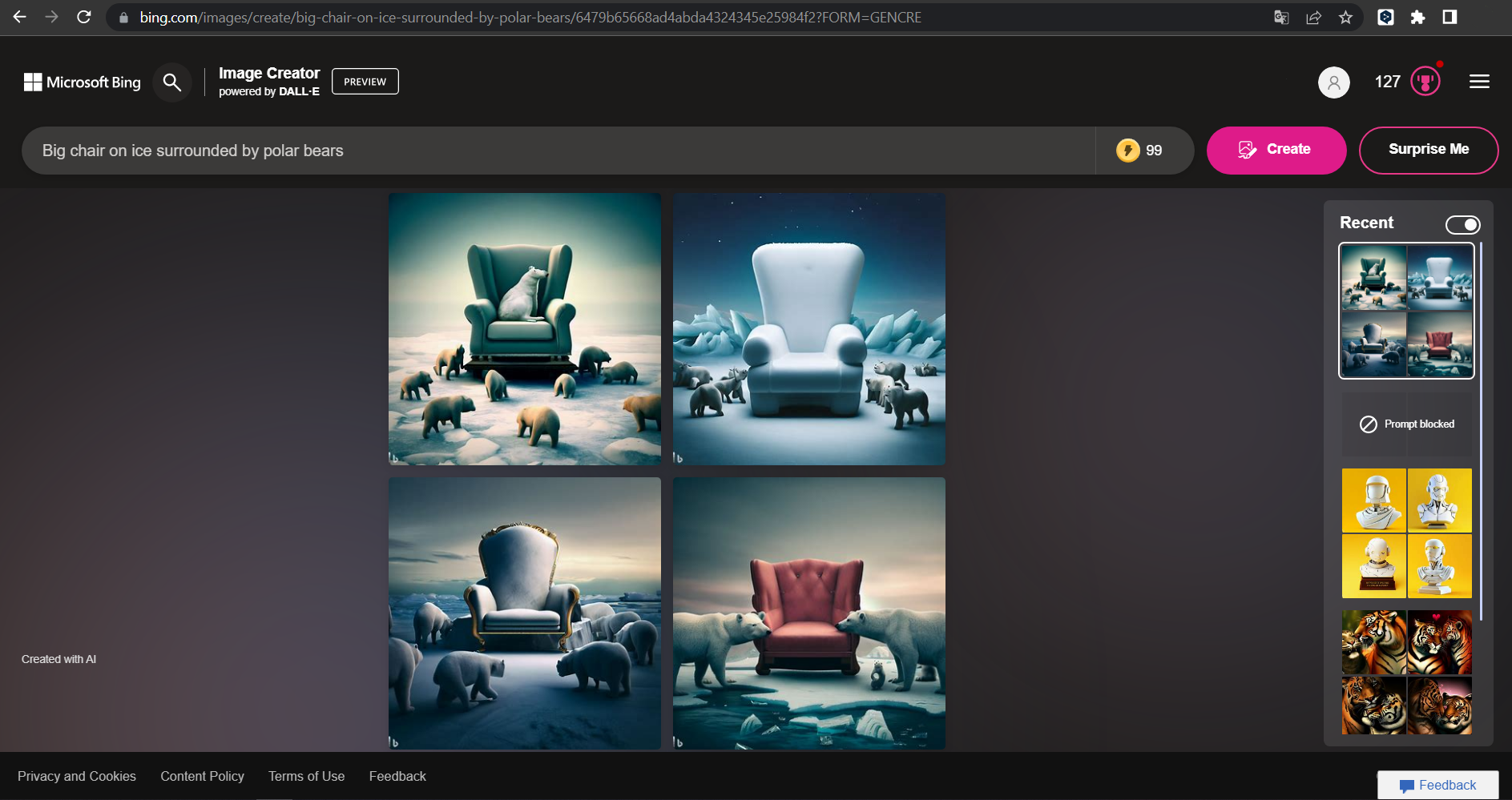
Video Search Comparison
Google Video Search
When it comes to video search, Google does not offer any standout features. It typically displays videos in a vertical list with larger thumbnails. When you enter a query, the video search results primarily show links to YouTube without the option to preview the videos. Of course, thanks to YouTube, Google provides the opportunity to earn through advertising. Bing also offers this to its users, but it is not on the same level as YouTube.
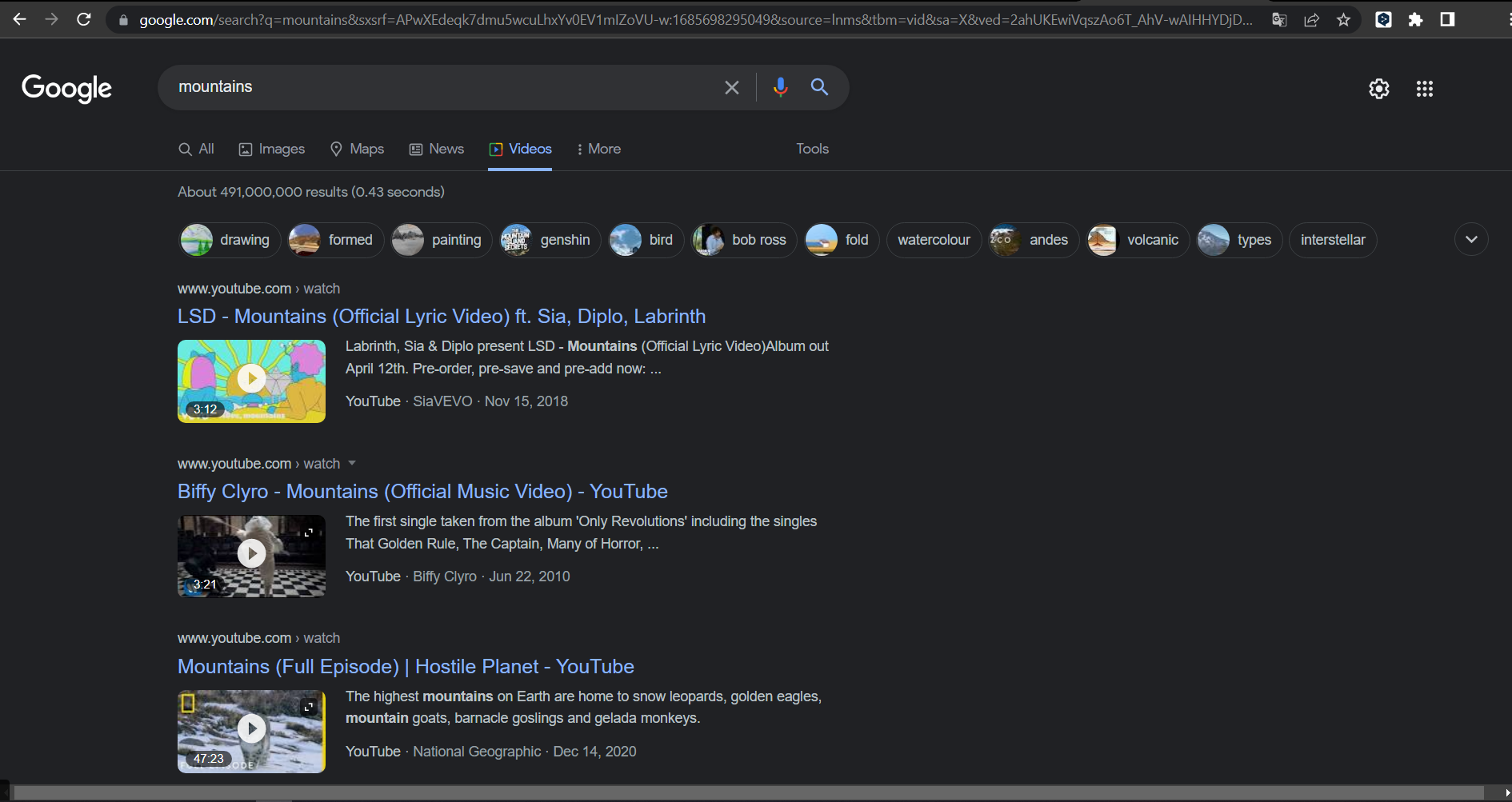
Bing Video Search
Similar to image search, Bing is not inferior to Google; in fact, it surpasses it in some aspects. When searching for videos on Bing, you can enjoy previews and expedite searching for the desired content. Additionally, when you click on a video, Bing suggests related queries and arranges the videos for easy scrolling. Moreover, you can create your playlist of videos by dragging and dropping videos into the left corner of the page.
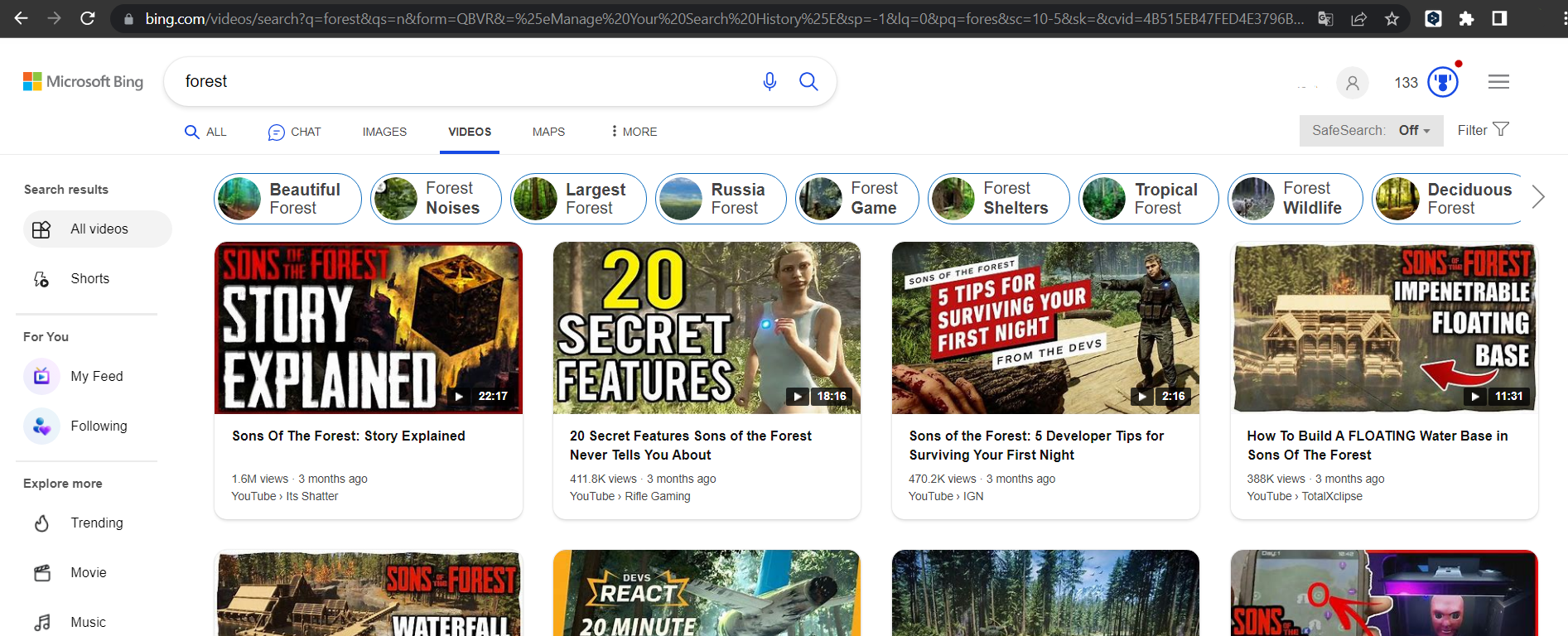
Search Algorithms and Result Quality Comparison
In this section, we will not separately discuss each search engine. Obviously, testing millions of queries is impractical. But as practice shows, both Google and Bing adequately satisfy the needs of an average user. Both search engines allow you to find information, images, news, videos, and popular online stores.
In general, the search results difference between Google and Bing is not significant at all. If we compare two screenshots of the search results for “Nicki Minaj,” we can see that Google immediately provides the most relevant information and links.
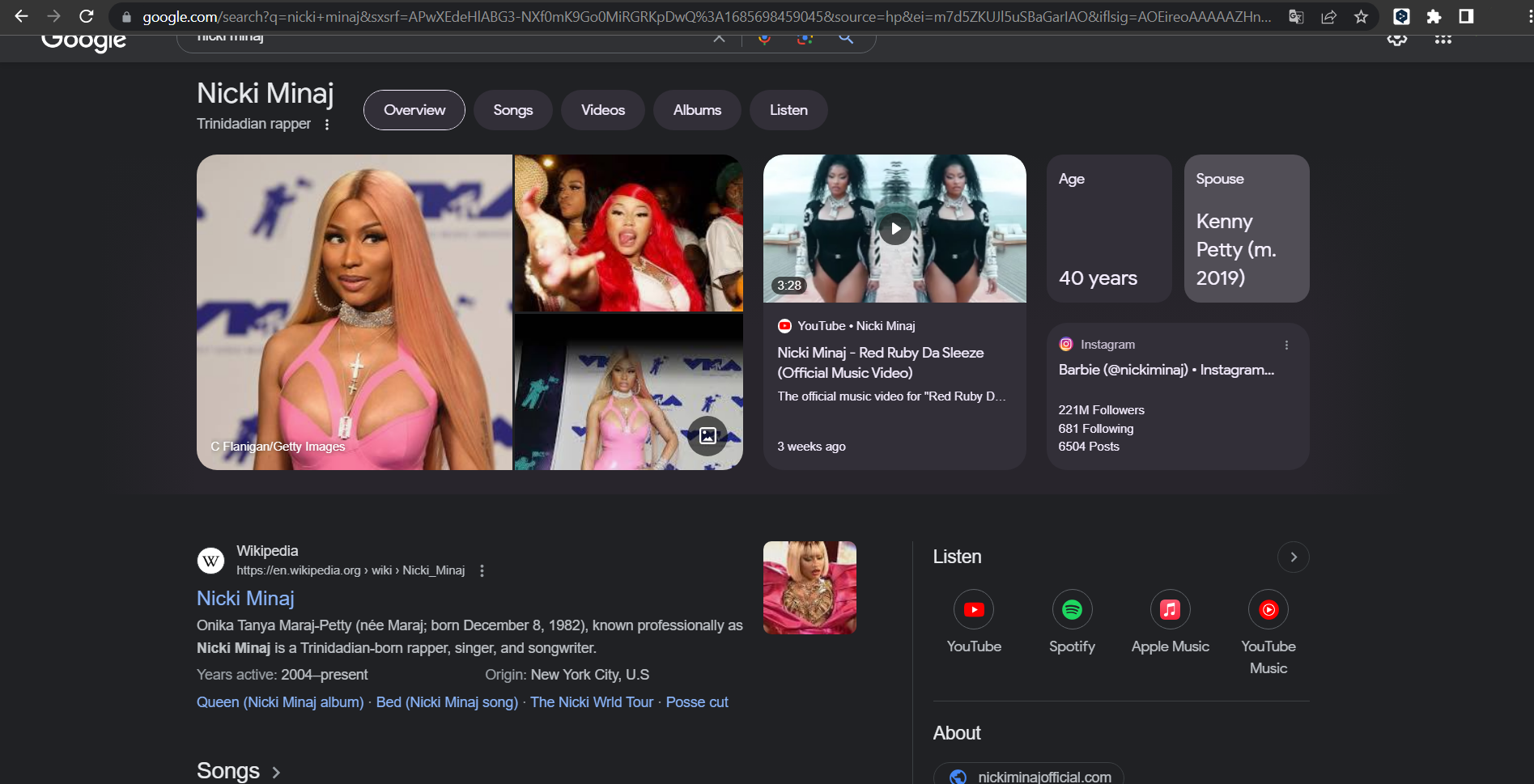
At the same time, Bing can not only give the same information as Google but also offer a concise summary of the query using AI.
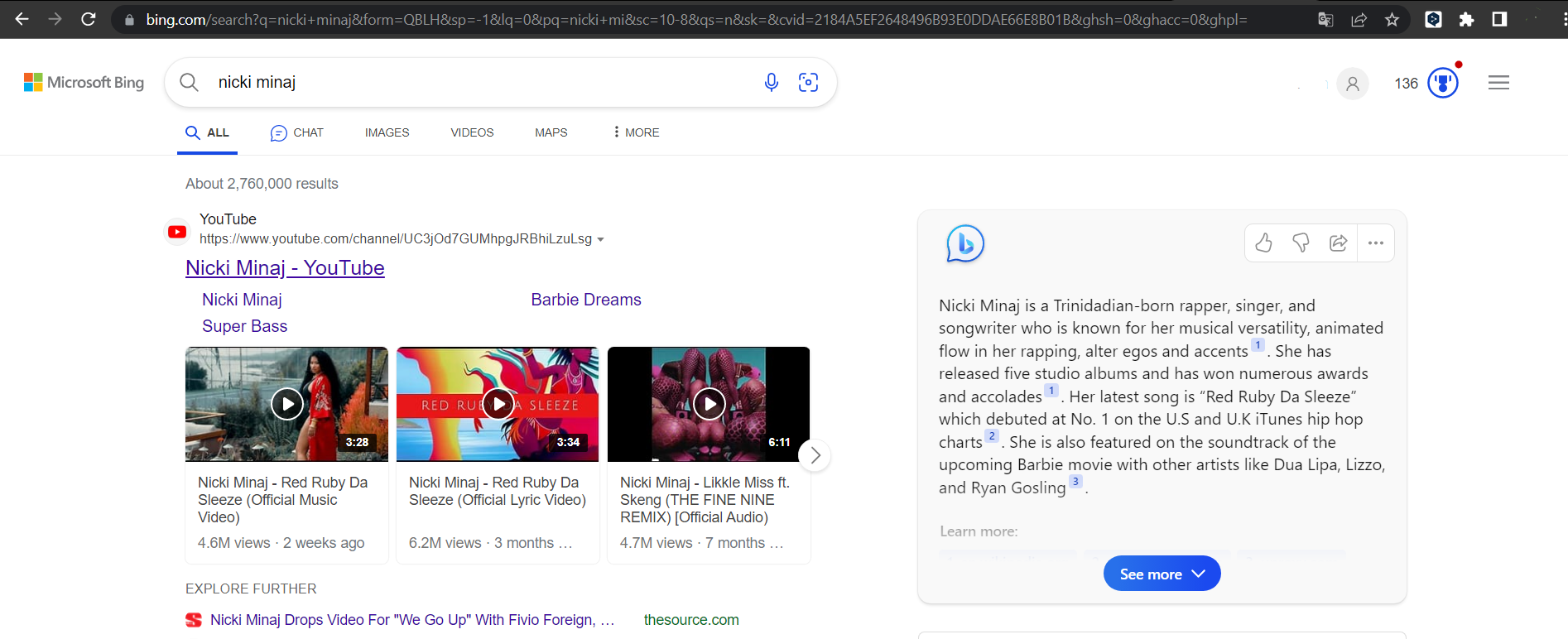
It is hard to definitively claim that one search engine is significantly better. When using them, everyone can expect quality answers to their queries.
Voice Search and Virtual Assistants Comparison
Google Voice Search
Google Assistant stands as a prominent voice search tool that seamlessly integrates with a range of Google services, including Gmail, Google Calendar, Google Maps, and Google Photos. This integration facilitates personalized assistance and grants access to pertinent information.
Bing Voice Search
Bing has notable advancements with its virtual assistant, Cortana. While Google Assistant may have a broader reach, Cortana offers a unique advantage for users within the Microsoft ecosystem, providing a more seamless experience across Windows devices. While Cortana is primarily associated with Windows devices, it can still be used on iOS and Android
Privacy and Data Handling
Google pays significant attention to ad personalization and uses user information to deliver targeted ads. The company collects extensive data from various sources, such as search history, location information, and browsing behavior.
Bing takes a relatively more privacy-focused approach. It still collects user data for advertising purposes, but it does not have the same level of data integration and personalization as Google. Bing tends to use less user-specific data and focuses more on providing anonymized and aggregated data to advertisers.
SEO for Google Search vs. Microsoft Bing
Backlinks
Both Google and Bing place a strong emphasis on trust when it comes to evaluating websites. A key aspect of establishing trust is the presence of backlinks, as they indicate that visitors have found your content valuable and reliable enough to share with others. The quality and quantity of backlinks can influence your ranking on these search engines.
To effectively monitor and analyze your backlink profile, use the WebCEO Backlink Checker to get invaluable insights and increase your rank in both search engines.
Bing
While Bing also emphasizes the importance of backlink quality, it defines quality differently compared to Google. Bing considers the age and reputation of your domain as crucial factors. While backlinks are not the sole determinant of rankings on Bing, they prefer backlinks from reputable websites, albeit in smaller quantities.
Moreover, backlinks from domain extensions like .gov, .edu, and .org are more trustworthy. Obtaining backlinks from such websites can contribute to your rankings.
Bing takes the measure of removing pages from its index if they lack a sufficient number of backlinks. However, Bing does not penalize the practice of purchasing backlinks while they caution against abusing or manipulating inbound links. Artificially inflating the number of backlinks pointing to your website will get your page removed from the Bing index.
Google assesses trust by analyzing PageRank, which measures the link equity flowing through backlinks from external domains to your content. High-PageRank backlinks carry substantial weight and hold more value than numerous low-quality backlinks that may be considered spammy.
Google values backlinks from authoritative websites, as they provide more significant benefits to the ranking of your web page.
Keywords
Keywords are vital in search engine optimization and effective search marketing strategies. Therefore, website owners must understand how each search engine handles keywords.
Bing
Bing does not excel at contextualizing keywords as effectively as Google does. Bing relies on meta keywords, tags, and descriptions. These metadata elements in the HTML code inform search engines about the subject matter of your website’s content.
According to Bing’s Webmaster Guidelines, it is recommended to utilize exact match keywords. This suggests that your website may achieve a higher ranking on the Bing search engine if you ensure the usage of keywords that exactly match the terms appearing in search results.
Furthermore, Bing Webmaster Tools provide insights into trending topics, related/suggested keywords, and URLs with ranking information.
Google employs a technique known as semantic SEO or semantic search, which has significantly improved search accuracy. This approach operates in two key ways. Firstly, it aims to comprehend the underlying intent behind a search query. Providing search results goes beyond merely answering a question; it involves deciphering the true intention of the searcher. Semantic search also endeavors to address any subsequent queries that may arise.
Secondly, it interprets contextual cues extracted from various web pages. RankBrain, an artificial intelligence component, holds immense importance in Google’s ranking algorithm. By embracing semantic search, Google places less emphasis on exact match keywords and instead prioritizes web pages that offer comprehensive and relevant information for potential visitors.
Multimedia Content
In response to evolving consumer preferences, many website owners incorporate multimedia content into their pages. Visual and video content is more enjoyable to consumers than plain text. Beyond its aesthetic appeal and effectiveness in information delivery, multimedia content also has the potential to improve search engine rankings.
Bing
One of Bing’s notable strengths is its ability to effectively crawl and comprehend diverse forms of multimedia content, including videos, audio, and images.
One way to leverage this opportunity is through Bing’s visual search feature. By capturing or uploading a photo, Bing’s technology can identify the object within the picture and provide relevant information through clickable links, enabling users to explore further.
Bing considers the presence of photos, videos, and other multimedia content on a website to be a more influential ranking factor compared to Google. Therefore, site owners who leverage multimedia content are more likely to be rewarded on Bing’s search engine.
For more insights on effectively diversifying content that is well-crawled by Bing, referring to Bing’s Webmaster Guidelines can be highly beneficial.
High-quality videos and photographs hold value for Google, although they are less significant than for Bing. Google primarily focuses on E.A.T.: Expertise, Authority, and Trust, giving greater importance to textual content.
Social Signals
Social signals encompass the metrics of likes, shares, and views that a web page accumulates on various social media platforms. Certain search engines perceive these signals as indicators of trustworthy, valuable, and relevant content. When users come across high numbers of likes, shares, and views, it can influence their decision to visit the website and share its content further.
Bing
Bing acknowledges the impact of social media on search rankings and emphasizes the influence of a brand. For instance, a highly influential website tends to attract a dedicated following, resulting in increased sharing of its information. Bing considers social signals a key ranking factor and incorporates ratings from Facebook friends and Twitter followers in search results for different businesses.
Despite speculation suggesting a potential minor role, Google has consistently refuted the notion that social signals hold a significant influence on page rankings. It treats Facebook and Twitter pages similarly to any other indexed pages without assigning special significance to social signals.
User Engagement
User engagement measures how users interact with a website or web page. It is a metric used by search engines to determine the relevance and quality of a webpage in relation to a particular search query. But how do Google and Bing consider user engagement when ranking?
Bing
User engagement is often assessed by examining the bounce rate, which refers to the number of visitors who quickly leave a website after arriving. In the case of Bing, this behavior is referred to as “pogo-sticking.” If a significant proportion of your site’s visitors promptly click the “back” button, it indicates to Bing that user engagement may be lacking.
However, Bing does not attach great importance to user engagement as Google does. Despite this, website owners should pay great attention to this metric, as user engagement should be a primary focus of any marketing strategy.
Google considers user engagement metrics, such as click-through rate (CTR), bounce rate, and dwell time, as important ranking factors. These signals help Google assess the quality and relevance of content, indicating whether users find a webpage valuable and engaging.
Page speed + Mobile Friendliness
Bing
Bing considers page speed and mobile friendliness as ranking factors, but it may not be as heavily weighted as Google. While Bing emphasizes providing a good user experience, it may be more relaxed than Google when it comes to penalizing slower-loading pages or not mobile-friendly websites.
Google considers page loading speed and mobile-friendliness as crucial factors in determining website rankings. It places a high priority on delivering relevant and high-quality content to its users promptly. Faster-loading pages not only contribute to a better user experience but also align with Google’s objective of providing optimal search results efficiently.
Website Structure + URL Hierarchy
Bing
Bing considers website structure and URL hierarchy as ranking factors. A well-structured website and URL helps Bing crawlers efficiently crawl and index your content. Bing values sites with a clear and organized structure, which makes it easier for users to navigate and find the information they want.
Google values websites that provide usability through a well-structured layout. It emphasizes a well-organized and logical site structure. Moreover, a clear hierarchical structure helps search engines understand your site’s content, which is crucial when crawling and indexing your content. It is useful to have a consistent navigation system, proper internal linking, and logical arrangement of pages and sections.
It is recommended to have descriptive and keyword-rich URLs that reflect the content hierarchy of your website. Clear and readable URLs provide both search engines and users with valuable information about the page’s topic and can positively impact rankings in Google’s SERPs.
Bonus Difference
One small difference remains when it comes to the indexing speed of Google and Bing. Google demonstrates itself quite reliably in terms of indexing speed by thoroughly browsing each page of a website. Bing, on the other hand, scans not all pages and can do so rather slowly.
But there is something you can do to make this process faster. One of them is the innovative open-source protocol IndexNow. Additionally, you can submit a sitemap to Bing by clicking the “Submit a Sitemap” button in Webmaster Tools or specifying its path in the robots.txt file. This step is crucial as it serves as a ranking signal.
Moreover, you can use the WebCEO Sitemap Generator. In the Sitemap Generation report, you will see when Google, Bing, and Yahoo! bots last visited your site.
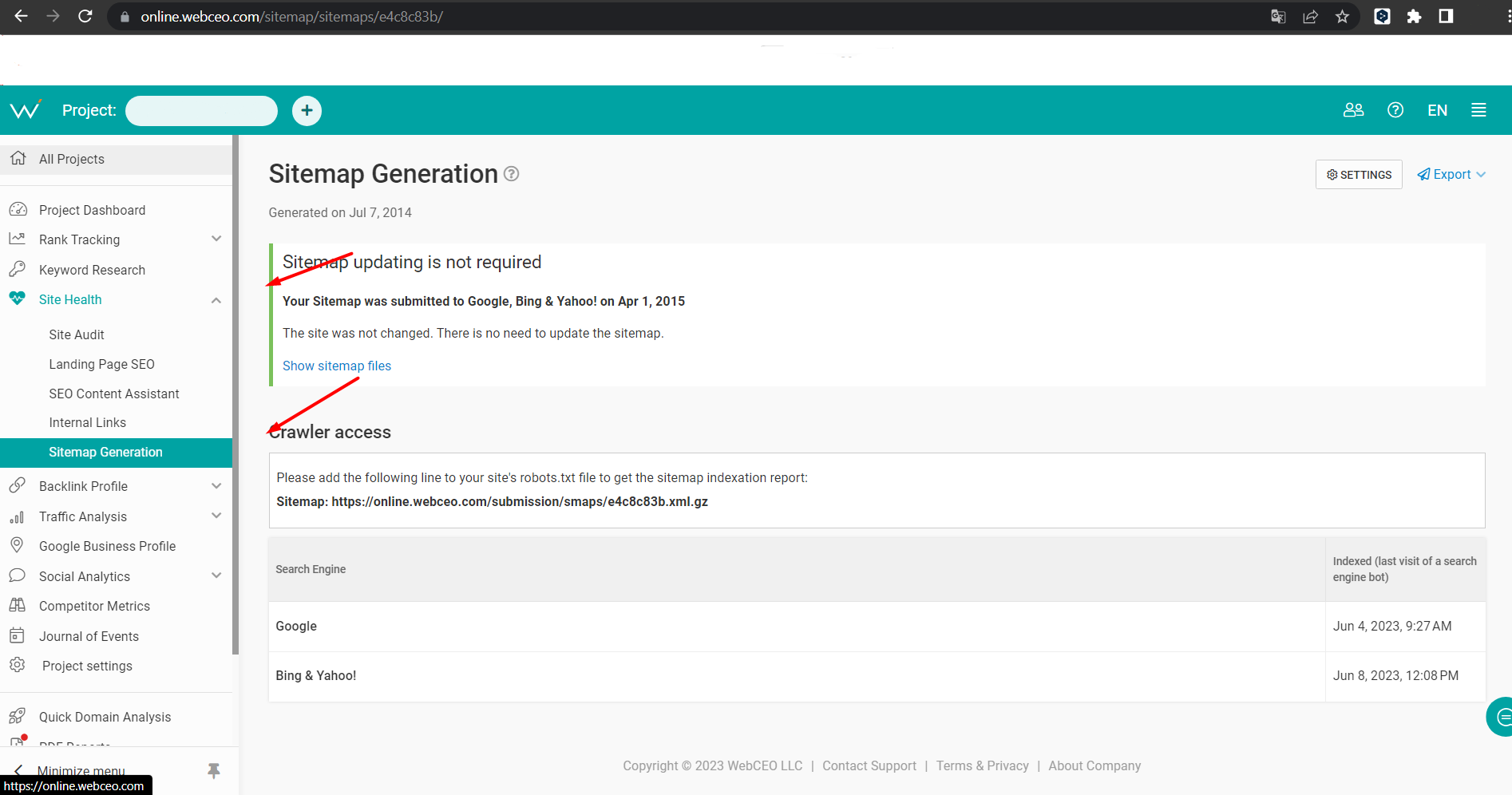
CONCLUSION
After in-depth research of Google and Microsoft Bing, we can say that both search engines are good enough to meet the requirements of any user.
While Google undeniably holds the lion’s share of the search engine market, we still should not underestimate the potential of Bing. With over 1 billion unique visits per month, a captivating homepage, and cutting-edge features like AI-generated images and seamless integration with Cortana, Bing has carved out its own distinct presence in the search engine landscape.
Like Google, Bing provides reliable search results, despite their variances in features like image and video searches.
Optimizing for both search engines is crucial. Backlinks play a significant role in establishing trust and improving rankings, with Bing placing a higher value on the number of backlinks, while Google favors high-quality and authoritative links. To ensure your site is well-optimized for Google and Bing, use the WebCEO Website Audit Tool.
Understanding the differences in keyword handling is also essential, as Bing relies more on exact match keywords while Google emphasizes semantic search.
Furthermore, multimedia content and social signals hold varying degrees of importance for both search engines. Bing places greater emphasis on multimedia content, while social signals play a role in Bing’s rankings but are not a significant factor for Google.
Finally, the decision between Google and Bing ultimately depends on individual preferences and objectives. While Google tries hard to dominate the search engine market, Bing has steadily grown its user base and offers a lot of charming features to make your search experience unique and special.
To maximize visibility and reach, website owners and marketers should consider optimizing their content for both search engines, taking into account their specific requirements and ranking factors. Utilizing tools like the WebCEO Content Assistant can greatly assist in this optimization process, ensuring content is tailored for maximum search engine effectiveness.
FAQ
- Which search engine, Google or Bing, has a larger market share?
Google currently dominates the search engine market with approximately 85.53% global market share as of March 2023, according to Statista.com. In comparison, Bing holds a smaller market share of around 8.23%.
- Can optimizing my website for Bing help improve my visibility among American internet users?
Yes, optimizing your website for Bing can enhance your visibility and reach among American internet users. Microsoft resources, including Bing, Yahoo, and voice search, account for approximately one-third of online searches in the United States. By optimizing for Bing, you can tap into this user base and potentially increase your website’s visibility.
- How does privacy and data handling differ between Google and Bing?
Google focuses heavily on ad personalization and collects extensive user data from various sources. This data integration allows for highly targeted advertising. Bing takes a relatively more privacy-focused approach, collecting user data for advertising purposes but with less data integration and personalization compared to Google. Bing focuses more on providing anonymized and aggregated data to advertisers. Users concerned about privacy may find Bing’s approach more appealing.
- Which search engine, Google or Bing, is better for businesses?
Both Google and Bing have their strengths when it comes to business visibility. Google holds a larger market share and offers extensive advertising opportunities through platforms like Google Ads. Bing, on the other hand, can provide additional visibility among American internet users and offers unique features like multimedia content emphasis. To maximize business reach, it’s recommended to optimize for both search engines.
- Are the search results on Google and Bing the same?
While the core functionality of search results is similar, there may be slight variations in the displayed results between Google and Bing. Google tends to prioritize comprehensive information and authoritative sources, while Bing offers concise summaries using AI and may display results from different sources. It’s always a good practice to compare and analyze search results on both platforms.
